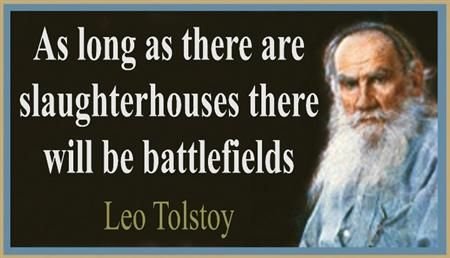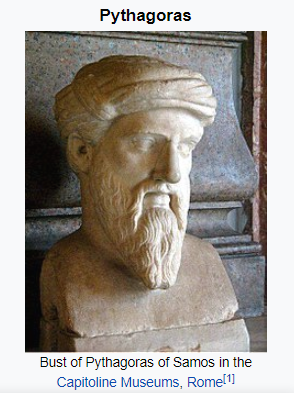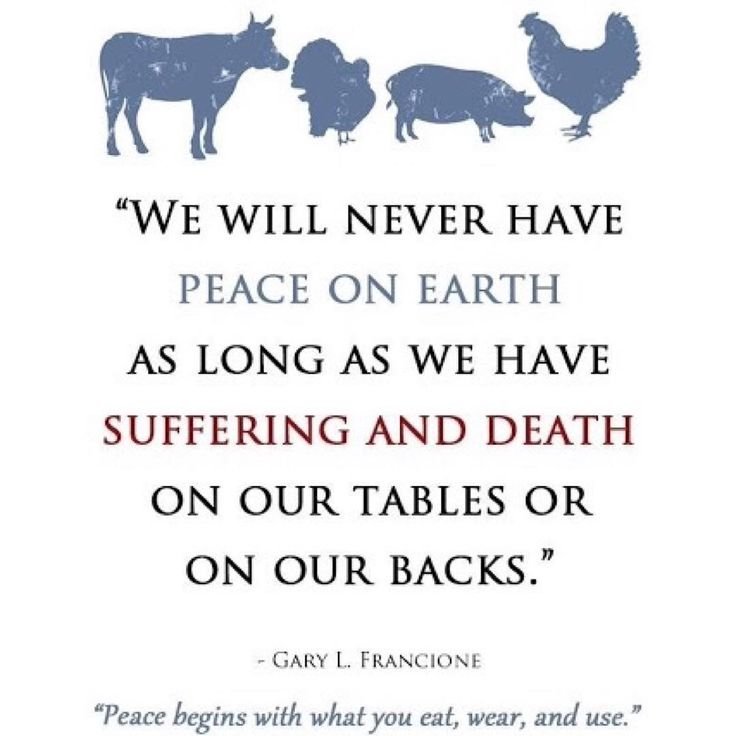Tolstoy, Pythagoras, and the Philosophy of Vegetarianism

"As long as there are slaughter houses, there will always be battlefields." - Leo Tolstoy (1828-1910)
Many will certainly argue that this assertion is false, that there is no relation between the mass killing of innocent animals in slaughterhouses to satiate man's desire to eat animal flesh (which is unnecessary to survive) fueled especially by the greed of the Big Food industry, and that of the mass killing of innocent humans on the battlefields of war to satiate the greed of and hunger for power by a few corporate and government elite; but these same people who make such arguments are usually those who think that there is nothing wrong with the senseless slaughter of innocent animals and who most likely feed the gruesome slaughterhouse industry by partaking in the consumption of slaughtered animals. Many of these are also the very same people who defend war as necessary - a 'necessary evil' they say, and even sometimes good - war is waged 'for the greater good' of mankind, they argue.
We will return shortly to the moral argument at hand, but first let us delve into the lesser known related history of vegetarianism as a moral and spiritual philosophy - expounded by Tolstoy, and also by Pythagoras some 1500 years prior to the life of this renowned Russian writer.
Leo Tolstoy is well known as the famous Russian novelist of the 19th century - "who is regarded as one of the greatest authors of all time," it is even written on Wikipedia - but much less so for his staunch advocacy of the spiritual philosophy of absolute nonviolence, based for him upon the teachings of Jesus, outlined most clearly in what has become commonly known as The Sermon on the Mount. Even fewer are aware that Tolstoy was both an avid vegetarian and also the leading influence behind Gandhi's conversion to the philosophy of absolute nonviolence and direct action as a form of resistance to state tyranny rather than through common democratic means such as voting.
We are surely all aware of the famous Indian peace activist, but what is not commonly taught to us in school (at least here in the West) is that it was in fact Leo Tolstoy's in depth treatise on nonviolence, his final book The Kingdom of God is Within You, that actually persuaded Gandhi to convert from his faith in British imperial 'democracy' as a viable means to solve the problems of India and bring about his country's independence, to the precepts of absolute nonviolent resistance to the State set forth by Tolstoy, and also Jesus himself some 1,900 years prior.
Getting back to the main subject of this post, it is unclear whether Tolstoy was familiar with the philosophy of Pythagoras, as his arguments for nonviolence and against the slaughter of animals came from his understanding of the teachings of Jesus combined with his own feelings on the matter - his own moral and spiritual guidance from within; but what cannot be denied is that his beliefs on the matter and particularly the quote above - whether or not he was aware of it - is but a rewording of the teaching of Pythagoras of Samos on this very matter from all the way back in the 500s BCE.
"As long as man continues to be the ruthless destroyer of lower living beings he will never know health or peace. For as long as men massacre animals, they will kill each other. Indeed, he who sows the seed of murder and pain cannot reap joy and love." - Pythagoras (~580-~495 BCE), via Ovid (source)

(Source: Wikipedia)
Just as the case is with Tolstoy, many people are familiar with Pythagoras from what they are taught about him in school and what he has become well known for in the West - namely his alleged contributions to modern science via such discoveries as the Pythagorean theorem and the fact that he became a famous and influential mathematician well ahead of his time; but what many people don't know about Pythagoras relates to his spiritual philosophy and its contributions to modern philosophy.
Not one original writing of Pythagoras survived history, but his teachings did survive via many of his Greek contemporaries and students, while his philosophy heavily influenced such Greek philosophers as Plato and Aristotle, the Jewish sect of the Essenes, and most certainly even the teachings of Jesus himself and his early followers. The influence of Pythagoreanism upon Jewish and early Christian ideas "will be recognised to be as important as it is indisputable," writes Howard Williams M.A. in 1883 in his book entitled The Ethics of Diet - A Catena.
Most notably, Pythagoras founded an ascetic religious brotherhood, The School of Pythagoras, where some 300 disciples were admitted and trained in the philosophy and lifestyle set forth by the Master - with the great purpose "to form a select society, regulated according to the higher ideal formed by him of human living," Williams writes - a community based on universal peace and the brotherhood of humanity as opposed to the common divisions and violence which still plagues humanity to this day. The prohibition of eating animal flesh was enjoined upon his inner circle of disciples, he denounced the practice of bloody animal sacrifice to the gods so common in his time, he drank no wine and bade his followers do the same, and he also believed and taught the doctrine of the "transmigration of souls," now commonly known in both the East and the West as reincarnation. Pythagoras taught that: "Animals share with us the privilege of having a soul." (attributed by Ovid)
"He first taught," says Diogenes, "that the property of friends is to be held for the common good; that friendship is equality; and his disciples laid down their money and goods at his feet, and had all things common." This is strikingly similar to the depiction of the community of the earliest disciples of Jesus as recorded in the book of Acts, as well as the communities of the Essenes which preceded them, of which there is now much historical evidence Jesus was also raised in or at the least both taught and heavily influenced by.
The Biblical book of Acts records that, following the death and ascension of Jesus, that the earliest disciples "were together, and had all things in common; and they began selling their property and possessions and were sharing them with all...and lay them at the apostles' feet for distribution to anyone as he had need." (Acts 2:44-45; 4:35)Even the wording itself here describing this brotherhood is such a close match to the words above describing the Pythagorean brotherhood, that the influence of the former upon the latter can hardly be denied.
Further, in the spirit of Pythagoras' belief in reincarnation, it is worth noting that "past life regression" sessions over the past decade directly reveal (for those willing to accept such as evidence) that the Essenes who prepared for the coming of Jesus (who was known by them as The Teacher of Righteousness), "were inspired by the ideas of the great sage Pythagoras on harmony, living an ethical life, and the proper ordering of communities." (The Essenes - Children of the Light by Stuart Wilson & Joanna Prentis, page 30)
Another striking similarity between the two spiritual Masters Pythagoras and Jesus is that they both admitted women into their inner circle of disciples, very much against the accepted societal norms of those times. Some of the women admitted into the School of Pythagoras even later became teachers and lecturers themselves.
Outside of his school, Pythagoras is said to have focused his teaching on abstaining from both the consumption of animal flesh and participation in the system of animal sacrifice on the political leaders of Rome, believing that if those with the power to wage war and influence the masses found it immoral to slaughter animals, that they would be entirely dissuaded from waging war, and also that such higher morals would slowly trickle down to the masses via their greater influence, and would in that way eventually bring about an age of true peace for humanity. After all, if people found it abhorrent to kill the lower living beings, his reasoning seems to have been, then how much more abhorrent would a man find killing another man to be? And when this becomes the case for enough of humanity, then war and all other murders of every kind would naturally cease.
And while this premise put forth by Pythagoras, Tolstoy, and many others arguably cannot be proven (for there is no time period in accepted recorded history where mankind was not slaughtering animals in which to see if wars and murder were also absent), a very strong case can nevertheless be made. And there is much evidence the two are related - that killing man and animal alike are unnatural human behaviors which must be taught and learned, rather than inherited, and are thus intertwined.
Just look at war: Men must first be indoctrinated, desensitized and trained for war before becoming good soldiers, or in other words obedient killing machines. The same is true for the slaughter of animals: Most people can only stomach the thought of eating meat (and the actual consumption of animal flesh itself) so long as the slaughter of the animal and its flesh they are eating is so far disconnected in their minds that they do not relate the one with the other. Further, most meateaters have never visited a slaughterhouse or seen the nonstop bloodshed perpetuated therein, let alone slaughtered the animals they eat themselves.
No, just like most who support a war but would rather someone else is sent off to the battlefield to kill, most meateaters prefer that the workers at the slaughterhouse massacre the animals they wish to eat themselves! And if you wish to prove this is not a natural behavior of humanity, just have any child eating a chicken dinner go out to a farm and see if they are willing to slaughter a hen, and you will in almost every case quickly find out they are most certainly not willing to kill it. Then slaughter the hen in front of the young child, and you will almost certainly find that chicken dinner is the last chicken meal that child will ever eat, and you will have probably also made a lifelong vegetarian out of them!
It is just as Tolstoy explains, that people don't consider it wrong or sinful to eat animals because their "false teachers" have convinced them of such, not because they are born with an innate desire to do so:
People don’t consider it base to eat animals because false teachers have convinced them that animals have been designated by God for people’s exploitation. This is a lie. It doesn’t matter in what book it’s written that it’s not a sin to kill animals, it is written more clearly in everyone’s hearts than in any book that one mustn’t kill animals, but rather one must sympathize with them just like with people. We all know this, unless we’ve silenced the conscience within us.
(For Every Day, March 3, entry 2)
No child is born wishing to kill birds, lambs, pigs or cows; and just as no child is born wanting to be a murderer of their fellow humans, but must first be indoctrinated into belief systems which endorse the mass murder carried out on the battlefields of war (such as patriotism, nationalism, racism, religious extremism, etc.); so children must first be taught to eat meat - and in most cases the dead animals they eat must also be disassociated with the slaughter of those animals such eating habits necessitate - before they become accustomed to doing so as a regular lifestyle habit.
Most children are indoctrinated into belief systems which endorse a lifestyle of eating meat from a very young age - such as being taught that God created animals for this purpose and wants us to eat meat, that the Bible or other religious texts teach us or permit us to eat meat, that animals don't have souls like we humans do and are therefore lesser beings than us - simply put on this earth to do with as we wish, or that the indulgence of the self is the highest societal ideal and therefore the desires and feelings of other beings whether human or animal simply don't matter. And such belief systems are the primary reason for which this practice as well as other hateful practices such as war are so widespread in society today.
After all, these types of ideologies are the same ones which fueled the racism of America's recent past - the idea that the black race was inferior to the white races, that they don't have souls like we do, or are not God's children like we are (and of course there was also the monetary drive behind racism fueling slavery in America as well) - and this was accepted by society for hundreds of years despite the fact that there is truly only one race among humanity: The human race! So it is with animals: We must first be taught that they are less than us in order to justify in our minds that their mass slaughter for our enjoyment and on behalf of corporate greed is somehow morally and socially acceptable.
The same goes with war: In order to justify the mass slaughter of a foreign people in a war, the people must first be convinced that those people are somehow less than us due to their location/nationality/skin color/religious preferences, and that we and our own people are somehow greater; that they are our 'enemies' and our own countrymen are our 'friends'; that theirs is a hostile foreign 'bad' nation, while ours is somehow friendly and 'good'; that they are a threat to our 'security', but that our treacherous and deceptive leaders have our best interests in mind.
In a nutshell, in order for war to continue we must first be convinced that our lives matter more than theirs, and their lives less than ours - simply because of what color skin we were born with, or what country we were born in, or what religion we identify with. It really isn't so different from how society justifies the mass murder of innocent animals who have never harmed, nor do they seek to ever harm any human (no matter how many of them we massacre), or even other animals for that matter. After all, the animals raised by the millions for the slaughter are not the so-called violent and vicious beasts; they are the most tame and docile of them all.
The teaching of Pythagoras depicted by Ovid sums up the practice of the needless cruelty of eating animals quite well, speaking to the hearts of those too stubborn to cease from a lifestyle pattern which causes needless suffering to fellow innocent living beings:
Alas, what wickedness to swallow flesh into our own flesh, to fatten our greedy bodies by cramming in other bodies, to have one living creature fed by the death of another! ...You cannot appease the hungry cravings of your wicked, gluttonous stomachs except by destroying some other life.
This is the insanity of the human reasoning handed down to us by our ancestors, pushed upon us by the global power elite, fueled by corporate greed, and blindly accepted by the masses; and the perpetuation of this type of reasoning by society has led to the continued mass murder of both man and beast alike, both on the battlefields of war and in the slaughterhouses across the world - especially the western world. Having seen that the exact same types of ignorant reasoning leads to both unnecessary mass murder of humans in war after war just to satiate the greed and feed the hunger of the elite who lust for power, as well as to the unnecessary mass slaughter of innocent animals to satiate the desire and feed the bellies of men who crave flesh; it is not hard to see the relation between slaughterhouses and battlefields, along with the unnecessary suffering and bloodshed created by both.
One may disagree that there is any correlation between slaughterhouses and battlefields, and deny any connection between man's willingness to kill animals and his willingness to kill his fellow man; but such denials can never wash away the endless rivers of blood created by both wars and slaughterhouses, and neither will they erase the wretched horrors caused by either from the minds of anyone who has witnessed them.

Thank you for your time and attention. If you appreciate the content of this post, please consider upvoting, resteeming and sharing. And keep your eyes open for a follow-up post, which I plan to put together in the near future regarding the overwhelming but widely unknown historical and scriptural evidence that Jesus and his initial disciples were in fact also vegetarians and vegans who taught this very same philosophy of peace shared by Pythagoras.
Such an interesting article mate. Really good read. Well done !!